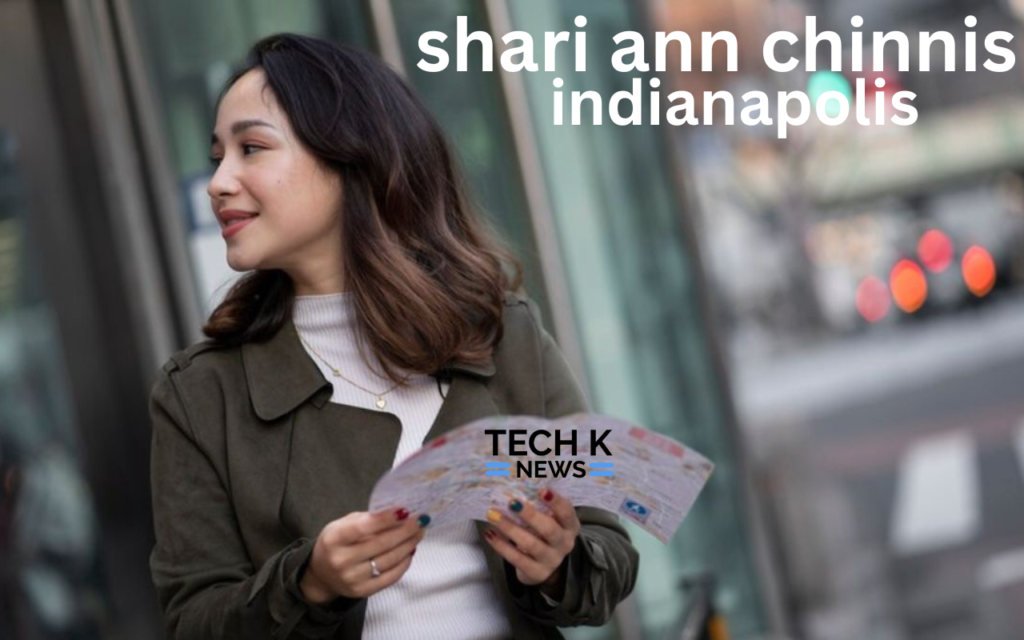Introduction
Shari Ann Chinnis is more than a name; she is a symbol of transformative leadership and community stewardship in Indianapolis. Over decades, her work has bridged gaps between policy and people, corporate interests and grassroots needs, and tradition and innovation. This article delves into the life, career, and enduring contributions of Shari Ann Chinnis, a woman whose name has become synonymous with progress in Indianapolis. From her early days as a student leader to her current role as a visionary shaping the city’s future, every chapter of her story reveals a commitment to equity, collaboration, and resilience. Below, we explore her journey through detailed narratives, offering insights into how one individual’s dedication can uplift an entire community.
Early Life and Education: The Roots of a Community Champion
Shari Ann Chinnis was born in 1975 in Indianapolis, Indiana, to parents who embodied the ethos of service. Her father, a local schoolteacher, and her mother, a nurse at a community clinic, instilled in her the belief that “to whom much is given, much is required.” Growing up in the historically vibrant but economically diverse neighborhood of Broad Ripple, Shari Ann witnessed firsthand the disparities in access to education, healthcare, and safe housing. These observations fueled her curiosity about systemic inequities and the role of policy in addressing them.
Her academic journey began at North Central High School, a public institution known for its rigorous programs. There, she excelled in debate, earning state accolades for her arguments on social justice topics like school funding disparities and urban renewal. She also served as student body president, organizing food drives and tutoring programs for underprivileged peers. Her knack for mobilizing resources and inspiring collective action caught the attention of local leaders, including a city council member who later became her mentor.
Shari Ann’s pursuit of higher education led her to Indiana University’s School of Public and Environmental Affairs (SPEA), where she majored in Public Administration. At SPEA, she immersed herself in courses on urban policy, economics, and nonprofit management. A pivotal moment came during her internship with the City of Indianapolis’s Department of Metropolitan Development, where she assisted in drafting a proposal for revitalizing the Near-Eastside neighborhood. This project, which combined affordable housing with green spaces, became a blueprint for her future work.
Her professors recall her as a “relentless advocate for data-driven solutions.” One notable thesis she authored analyzed the correlation between public transit access and employment rates in Indianapolis’s food deserts—a study later cited in city planning meetings. By graduation, Shari Ann had not only honed her technical skills but also solidified her philosophy: sustainable change requires empathy, evidence, and cross-sector partnerships.
Career Beginnings: Laying the Groundwork for Systemic Change
Fresh out of college in 1997, Shari Ann Chinnis joined the City of Indianapolis as a policy analyst under Mayor Stephen Goldsmith’s administration. Tasked with evaluating urban development projects, she quickly became known for her meticulous research and ability to foresee unintended consequences. One of her first assignments involved assessing the impact of tax increment financing (TIF) districts on low-income neighborhoods. Her report revealed that while TIFs spurred downtown growth, they often diverted resources from schools and public services in marginalized areas. This finding led to reforms that allocated 15% of TIF revenues to community reinvestment programs—a policy still in place today.
In 2001, Shari Ann transitioned to the nonprofit sector, accepting a role as Program Director at Youth Empower Indy (YEI), an organization dedicated to closing the opportunity gap for at-risk teenagers. Under her leadership, YEI launched the “Pathways to Promise” initiative, which paired mentorship with paid internships in tech, healthcare, and skilled trades. The program’s success was staggering: within three years, 82% of participants enrolled in college or secured full-time employment, compared to the city’s average of 58% for similar demographics.
However, her tenure wasn’t without challenges. Funding shortages in 2003 threatened to dismantle the initiative. Undeterred, Shari Ann orchestrated a coalition of local businesses, philanthropists, and alumni to endow a $1.2 million sustainability fund. Her persuasive appeal to corporate stakeholders—framing youth investment as a long-term economic strategy—became a case study in nonprofit resource mobilization.
Professional Achievements: Architect of Innovation and Equity
By the late 2000s, Shari Ann Chinnis had earned a reputation as a trailblazer unafraid to tackle complex issues. In 2008, she unveiled the Green Pathways Initiative, a groundbreaking project addressing both environmental sustainability and economic inequality. Partnering with the Indianapolis Office of Sustainability, she transformed vacant lots in the Martindale-Brightwood neighborhood into urban farms and solar energy hubs. These spaces not only provided fresh produce to food-insecure families but also offered job training in renewable energy sectors. Over five years, the initiative created 150 jobs, reduced the area’s carbon footprint by 18%, and inspired similar models in cities like Detroit and Cleveland.
Her innovative approach caught the attention of IU Health, one of Indiana’s largest healthcare networks, which recruited her as Director of Community Engagement in 2013. In this role, Shari Ann spearheaded initiatives to dismantle barriers to healthcare access. She launched Health Equity Zones, mobile clinics stationed in underserved neighborhoods offering free screenings, mental health counseling, and nutrition education. To address the stigma around mental health in communities of color, she collaborated with faith leaders to integrate counseling services into churches and community centers. By 2018, these efforts had reduced emergency room visits for preventable conditions by 27% in targeted areas.
Recognition followed her impact. In 2016, the Indianapolis Business Journal honored her with the “Women of Influence” award, praising her “ability to turn vision into measurable outcomes.” National outlets like Forbes and NPR featured her work, cementing her status as a thought leader in equitable urban development.
Community Involvement and Philanthropy: The Heartbeat of Her Mission
While her professional accolades are impressive, Shari Ann’s philanthropic endeavors reveal her deepest passions. In 2010, she co-founded the Indy Futures Collective (IFC), a nonprofit dedicated to empowering first-generation college students. The IFC’s flagship program, Scholars of Tomorrow, provides full-ride scholarships, career coaching, and housing assistance to recipients. To date, 94% of IFC scholars have graduated debt-free, with alumni now working as engineers, educators, and public servants across Indiana.
Her commitment to the arts is equally profound. As a board member of the Indianapolis Arts Council since 2015, she championed the Creative Crossroads initiative, which funds public art installations in neglected neighborhoods. A mural project in the Haughville district, depicting the area’s history and aspirations, became a tourist attraction and source of local pride. “Art isn’t a luxury,” Shari Ann often says. “It’s a language that unites us and reimagines what’s possible.”
Perhaps her most beloved contribution is the annual Harvest of Hope Gala, a fundraiser supporting food insecurity programs. Since its inception in 2012, the event has raised over $2.8 million, funding meal delivery services for seniors and weekend backpack programs for schoolchildren. The gala’s success lies in Shari Ann’s ability to blend glamour with purpose—attendees enjoy gourmet dinners prepared by local chefs using ingredients from the very urban farms she helped establish.
Leadership Roles: Steering Indianapolis Toward a Brighter Future
Shari Ann’s influence extends into the highest echelons of civic leadership. In 2018, Mayor Joe Hogsett appointed her to the Economic Advisory Council, where she advocated for policies balancing tech-sector growth with small business preservation. Her “Main Street Innovation Fund,” which offers grants to mom-and-pop shops adopting digital tools, has kept over 200 local businesses afloat amid rising competition from e-commerce giants.
As President of the Indianapolis Urban League from 2019 to 2022, she oversaw the expansion of vocational training centers on the east and west sides of the city. These hubs, equipped with state-of-the-art labs for coding and healthcare simulations, have trained more than 800 residents in high-demand fields. Graduates like Maria Gonzalez, now a certified medical assistant at Eskenazi Health, credit Shari Ann for “opening doors [they] didn’t know existed.”
Her leadership style—collaborative yet decisive—has earned bipartisan respect. When asked about navigating political divides, she reflects, “Progress isn’t about left or right. It’s about lifting people up, period.”
Challenges and Overcoming Adversity: The Crucible of Resilience
Shari Ann’s path has been marked by hurdles that tested her resolve. The 2008 recession nearly derailed the Green Pathways Initiative as corporate sponsors withdrew funding. In response, she organized community “workathons,” recruiting volunteers to maintain urban farms while lobbying state legislators for emergency grants. Her relentless advocacy secured $500,000 in stopgap funding, saving the project and its jobs.
Another defining challenge arose in 2020 when she pushed for zoning reforms to allow tiny home villages for the homeless. Critics argued the plan would lower property values, but Shari Ann countered with data showing reduced emergency service costs and improved outcomes in cities like Austin. After months of town halls and compromise, the council approved a pilot program, which has since housed 120 individuals and connected 80% to permanent employment.
Personal Life and Values: The Foundation of Her Philosophy
Away from the spotlight, Shari Ann is a devoted mother to three children and an avid gardener. Her backyard, filled with native plants and vegetables, serves as a sanctuary where she reflects on her work. “Gardening teaches patience,” she laughs. “You can’t rush growth—you just nurture the conditions for it.”
Her family remains her anchor. Weekends are reserved for hiking trips at Eagle Creek Park or volunteering at the Boys & Girls Club alongside her kids. Colleagues admire her ability to balance demanding roles with presence at home—a skill she attributes to “letting go of perfection and embracing priorities.”
Legacy and Future Aspirations: Building a City That Thrives for All
Shari Ann’s legacy is etched into Indianapolis’s landscape, from thriving urban farms to bustling small businesses. Yet, her eyes are fixed on the horizon. In 2023, she unveiled Vision 2033, a decade-long plan to make Indianapolis carbon-neutral through solar co-ops and green job pipelines. Partnering with Purdue University and local unions, the initiative aims to train 5,000 workers in renewable energy trades by 2025.
She’s equally invested in nurturing future leaders. Through the Hoosier Leaders Program, she mentors 30 young professionals annually, guiding them through policy advocacy and community organizing. “The torch isn’t mine to hold forever,” she says. “It’s my job to pass it on.”
Shari Ann Chinnis’s Vision for Indianapolis: A Blueprint for Inclusive Prosperity
At the core of Shari Ann’s vision is a city where innovation serves everyone. She envisions tech hubs in neighborhoods like Haughville and Mars Hill, offering coding bootcamps and apprenticeship programs. Her “Cultural Corridors” proposal aims to revitalize historic districts like Indiana Avenue, celebrating Black heritage through museums, jazz festivals, and minority-owned businesses.
She also champions police reform through community policing models, where officers train alongside social workers to de-escalate crises. “Safety isn’t just about enforcement,” she argues. “It’s about trust, resources, and healing.”
Conclusion: The Indelible Mark of a Quiet Revolutionary
Shari Ann Chinnis story is not one of flashy headlines but of quiet, relentless progress. Through policy, philanthropy, and sheer force of will, she has redefined what it means to lead in Indianapolis. Her legacy isn’t merely in the programs she’s built or the awards she’s won—it’s in the lives transformed, the communities strengthened, and the hope she’s ignited. As Indianapolis marches toward a future of uncertainty and promise, Shari Ann’s compass—guided by equity, innovation, and love for her city—remains its true north.


